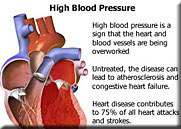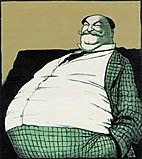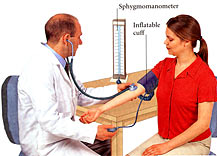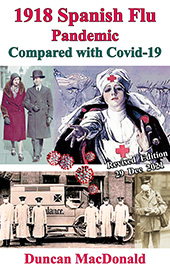Duncan MacDonald
Jakarta 2 September 2006
What is Hypotension ?
Hypotension is the medical term for low blood pressure. The pressure with  which the blood is pumped around the circulation varies between individuals and throughout the day. Blood pressure at the lower end of normal range is not likely to produce symptoms. However if the pressure in the circulation falls below the level needed to provide the brain with enough blood, light-headedness or fainting may occur. [1]
which the blood is pumped around the circulation varies between individuals and throughout the day. Blood pressure at the lower end of normal range is not likely to produce symptoms. However if the pressure in the circulation falls below the level needed to provide the brain with enough blood, light-headedness or fainting may occur. [1]
 which the blood is pumped around the circulation varies between individuals and throughout the day. Blood pressure at the lower end of normal range is not likely to produce symptoms. However if the pressure in the circulation falls below the level needed to provide the brain with enough blood, light-headedness or fainting may occur. [1]
which the blood is pumped around the circulation varies between individuals and throughout the day. Blood pressure at the lower end of normal range is not likely to produce symptoms. However if the pressure in the circulation falls below the level needed to provide the brain with enough blood, light-headedness or fainting may occur. [1] What causes hypotension ?
Low blood pressure usually occurs as a result of dehydration following loss of large amounts of fluid or salts from the body, e.g. heavy sweating, loss of blood, or profuse diarrhoea.Hypotension may also be caused by disorders that reduce the heart's ability to pump blood, such as heart failure, or heart attack (myocardial infraction), or irregular heart beat (arrhythmias).
Abnormal widening of the blood vessels as a result of an infection of the bloodstream (septicaemia) or a severe allergic reaction (anaphylaxis) can also cause hypotension.
You may not have symptoms of hypotension unless your blood pressure is very low, but they include;
• Tiredness
 • General weakness
• General weakness • Light-headedness and fainting
• Blurred vision
• Nausea
What may be done
Seek medical treatment. If caused by dehydration your doctor may need treatment with intravenous fluids. If your doctor suspects an underlying disorder such as a heart condition, you may be admitted to hospital for tests and treatment. If medication is causing hypotension, your doctor will probably advise a change of drug or dosage.
What is Hypertension?
Hypertension is persistent high blood pressure that may damage the arteries of the heart. If left untreated hypertension can result in damage to the eyes, kidneys and other delicate tissues. The higher the blood pressure, the greater the risk of heart attack, coronary heart disease and stroke.There are several categories of blood pressure, including:
| • Normal: less than | 120 / 80 |
| • Pre-hypertension: | 120-139 / 80-89 |
| • Stage 1 hypertension: | 140-159 / 90-99 |
| • Stage 2 hypertension: | 160 and above / 100 and above [2] |
People whose blood pressure is above the normal range should consult their doctor about methods for lowering it.
Hypertension facts
• In the UK, about 1 in 6 adults has persistent high blood pressure• In the USA about 1 in 4 adults has persistent high blood pressure
• Hypertension is more common with increasing age
• Hypertension is slightly more common in males
• Hypertension often runs in families, more common in black people
• Lifestyle has a direct influence, alcohol abuse; high salt diet and excess weight are risk factors
What are the symptoms?
Hypertension does not usually cause symptoms, but if your blood pressure is very high, you may have;• Headaches

• Dizziness
• Blurred vision
• Chest pain
• Difficulty breathing
• Irregular heartbeat
• Blood in the urine
However usually the only symptoms that develop are those due to the damage caused by hypertension. By this time, irreversible damage to arteries and organs has occurred.The first indication may be a fatal stroke or heart attack without warning.
What causes hypertension?
In 9 out of 10 people there is no obvious cause for the condition. However both lifestyle and genetic factors may contribute. The condition is most common in middle aged and elderly people because the arteries become rigid with age.Although hypertension occurs most in developed countries, it is now a significant problem in the developing world. The condition is rare in countries where people typically have a low salt diet, suggesting that salt may be a contributing factor.
Several factors and conditions may play a role in its development, including:
• Smoking

• Obesity
• Lack of physical activity
• Too much salt in the diet
• Too much alcohol consumption (no more than 1 to 2 drinks per day)
• Older age
• Genetics [3]
Hypertension in pregnant women can lead to the development of potentially life threatening conditions pre-eclampsia and eclampsia (high blood pressure, fluid retention & protein in the urine in pregnancy which may lead to seizures & coma). The elevated blood pressure usually returns to normal after birth.
How is it diagnosed?
Blood pressure measurement is a routine part of having a physical examination. A measuring device called a sphygmomanometer gives a blood pressure reading is systolic pressure (the higher figure) when the heart contracts and diastolic pressure when the heart relaxes. Your blood pressure should be taken when you are sitting or lying down.
sphygmomanometer gives a blood pressure reading is systolic pressure (the higher figure) when the heart contracts and diastolic pressure when the heart relaxes. Your blood pressure should be taken when you are sitting or lying down. An inflatable cuff is wrapped around your upper arm and inflated using a bulb. The cuff is slowly deflated while the doctor listens to the blood flow through an artery in your arm using a stethoscope.
Blood pressure is shown by the height of a column of mercury (in units of mmHg).
If your blood pressure is higher than 140/90 mmHg your doctor may ask you to return in a few days so it can be checked again.
The White Coat Syndrome: Some individuals become anxious when they visit their doctor, which may cause a temporary rise in blood pressure. It is suggested you should have your blood pressure taken at least twice on each visit as invariably the second reading will be lower than the first. A diagnosis of hypertension is usually not made unless you have elevated blood pressure on three separate occasions.
The War Over Salt
The American Medical Association is going after the American Government and the food industry to reduce what it sees as a persistently high level of salt in many processed foods.
In its annual meeting late June 2006, the Medical Association, which had never before called for regulation of a food ingredient, recommended that the Food and Drug Administration limit the amount of salt that food companies are allowed to add to products.
The National Academy of Sciences' Institute of Medicine said it had been known for at least 2 decades that salt-induced high blood pressure is a significant contributor to heart disease and stroke, the Nº 1 and Nº 3 causes of death in the United States. (Cancer ranks second).
The US Governments dietary guidelines say that the average young adult should eat less than 2,300 milligrams of sodium a day. The threshold for people with high blood pressure should be 1,500 milligrams.
Yet, on average Americans consume more than 3,300, milligrams of sodium a day, up from 3,100 milligrams in 1994. [4]
Workplace: High Blood Pressure? Don't Blame Your Job
A nerve wracking job or a nasty boss may make life miserable, but a review of studies by Dr Samuel J Mann, professor at Weill Medical College of Cornell University, has discovered that only a minority of reports found any association between job stress and high blood pressure. "There is no doubt that stress raises blood pressure transiently (for a short time)" Dr Mann said. "But also most everybody has the misconception that stress causes high blood pressure, but we have not been able to prove that despite 50 years of research."
"There is no doubt that stress raises blood pressure transiently (for a short time)" Dr Mann said. "But also most everybody has the misconception that stress causes high blood pressure, but we have not been able to prove that despite 50 years of research." "I'm not saying stress is good," Dr Mann said, "and it appears to have deleterious effects such as increased likelihood of coronary disease. If it leads to excess drinking and eating, those factors can cause persistence high blood pressure, but is the effect of overeating and excess drinking, rather than the effects of the job itself, that is responsible." [5]
Daily Dose of Dairy May Help With Hypertension
People who regularly consume low-fat dairy products may be less likely to develop hypertension, researchers have found.
Researchers from The National Heart, Lung and Blood Institute looked at the eating habits of almost 5,000 people taking part in a heart study and found that those who took in two or more servings of low-fat foods like milk, cheese and yogurt tended to have lower blood pressure.
"These findings lend support to the recommendation of low-fat dairy consumption as a mean to lower blood pressure," wrote the researchers, who were led by Dr Luc Djousse of Harvard Medical School.
While this study did find a link between dairy consumption and lower blood pressure, it was not clear why this was so. Calcium alone did not appear responsible for the benefit, suggesting that some other nutrient may play a role. [6]
How is it treated? 
Hypertension cannot be cured but can be controlled with treatment. If you have mild hypertension, changing your lifestyle is often the most the most effective way of lowering your blood pressure. You should reduce your salt and alcohol intake. Even reducing your weight by 5 kg can have a positive effect. If self help measures are not effective in reducing your blood pressure, your doctor may prescribe anti-hypertensive drugs. You may be prescribed just one drug or a combination of several. The type of drug and the dosage should be tailored to the individual.
CONCLUSION
• Start an exercise program. Obtain a medical clearance before starting.• The exercise program should be gradual, regular and aerobic in nature (walking/cycling). Start by walking 5 days a week for 10-20 minutes.

• Give up smoking (or at least cut down). Giving up smoking has been shown to be the one of the greatest single factors in improving your health fast.
• Eliminate salt from your diet. As salt travels through your body it draws fluid out of the blood vessels, which in turn increases your blood pressure.
• Avoid isometric exercises. These are exercises where you exert force against an immovable object, i.e. trying to lift something really heavy. You generally hold your breath whilst doing this, and that will make your blood pressure skyrocket.
• If you are overweight, endeavour to loose at least 5 kg initially.





